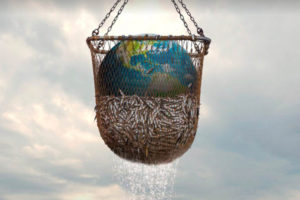By: Renaud Gignac, economist and spokesperson, Coalition for a Sustainable Food Transition,
and David Steele, President, Earthsave Canada.
The recent 2022 UN Biodiversity Conference, COP15, came to a close to much fanfare. Many environmental groups and observers applauded the outcome. Federal Environment Minister Steven Guilbeault called it “a great step forward in history.” Perhaps, but it was a far, far smaller step than is needed.
While significant progress was made, including the target of protecting 30% of the world’s land and oceans and the mobilization of US$200 billion by 2030 for this purpose, the delegates chose to sweep under the rug one of the main causes of the degradation of our biosphere: the consumption of meat, fish and other animal products.
Our food system is the problem
The United Nations Environmental Program (UNEP) has identified our food system as the primary driver of biodiversity loss. Its 2021 report, conducted in collaboration with the distinguished independent policy institute Chatham House, identified agriculture as responsible for 75% of deforestation to date and as the top threat for 86% of the tens of thousands of species in danger of extinction. Animal agriculture, the report emphasizes, is the prime driver of this destruction. While we obtain, globally, only about 18% of our calories from animal products, some 80% of the world’s agricultural land is used to raise and feed farmed animals.
The Intergovernmental Science-Policy Platform on Biodiversity and Ecosystem Services or IPBES (the biodiversity equivalent of the IPCC) has similarly sounded the alarm about animal agriculture. In its latest global assessment report, it pointed out that between 2007 and 2012, 290,000 km2 of land was cleared for agriculture – mainly to feed livestock. This was an increase of 29% over the amount of land cleared between 2000 and 2006. Tragically, this is a trend that continues to accelerate.
To counter the increasing destruction, both the IPBES and the UNEP recommend that governments promote a transition to diets with fewer animal products and more plant-based foods. Quoting the UNEP, “Such a shift, coupled with the reduction of global food waste, would reduce demand and the pressure on the environment and land, benefit the health of populations around the world, and help reduce the risk of pandemics.”
Hopes dashed for action by COP15
At the beginning of the COP15 process, there was hope that the delegates would heed this reality. Indeed, an early version of the proposed agreement, known as the Kunming-Montreal Global Biodiversity Framework, included in Target 16 a goal supported by the European Union, Denmark and Switzerland to “halve the global dietary footprint”, echoing the scientific consensus.
But it was not to be. Among other countries, Canada was opposed to this provision and, in the end, the final text of the agreement no longer mentions food types, with Target 16 now targeting only “overconsumption” and “food waste” in the broad sense.
There is progress in the COP15 agreement, but it is far from enough. It is not reasonable to ignore the primary driver of biodiversity loss and call the result a success.
Some governments are making progress
On the bright side, some governments are taking the necessary initiative and leading the way. Earlier this month, the European Union adopted a standard banning the import of foods produced from deforestation, including cattle, palm oil and coffee associated with such destruction. COP15’s host city, Montreal, made a strong gesture last May when it signed the Good Food Cities Declaration, in which it committed to promoting a plant-based diet.
But as the COP15 agreement makes all too clear, there is still a long way to go before the promotion of sustainable food goes beyond scientific circles and takes root in the wider political sphere. That is a major tragedy.
COP15 is the most recent example of the reluctance of our politicians to promote behavioral changes that, although they may be challenging, are absolutely essential to curb deforestation and protect biodiversity. On the eve of a possible sixth mass extinction to which our eating habits substantially contribute, there is simply no good reason not to take the crucial steps necessary to curb our consumption of animal products.

About Renaud Gignac
Renaud is a climate policy expert with a background as an economist and a lawyer. He held various positions at the Quebec Ministry of Environment and Climate Change, the Canadian Climate Institute, in the private and nonprofit sectors, and in academia. He is a co-founder of the Coalition for a Sustainable Food Transition.




